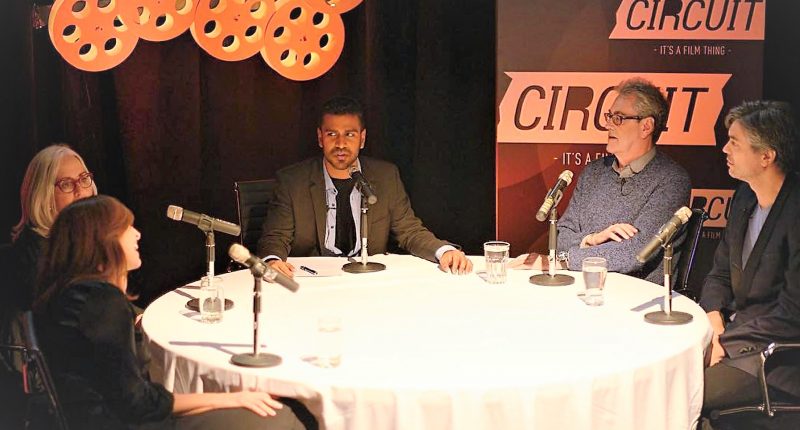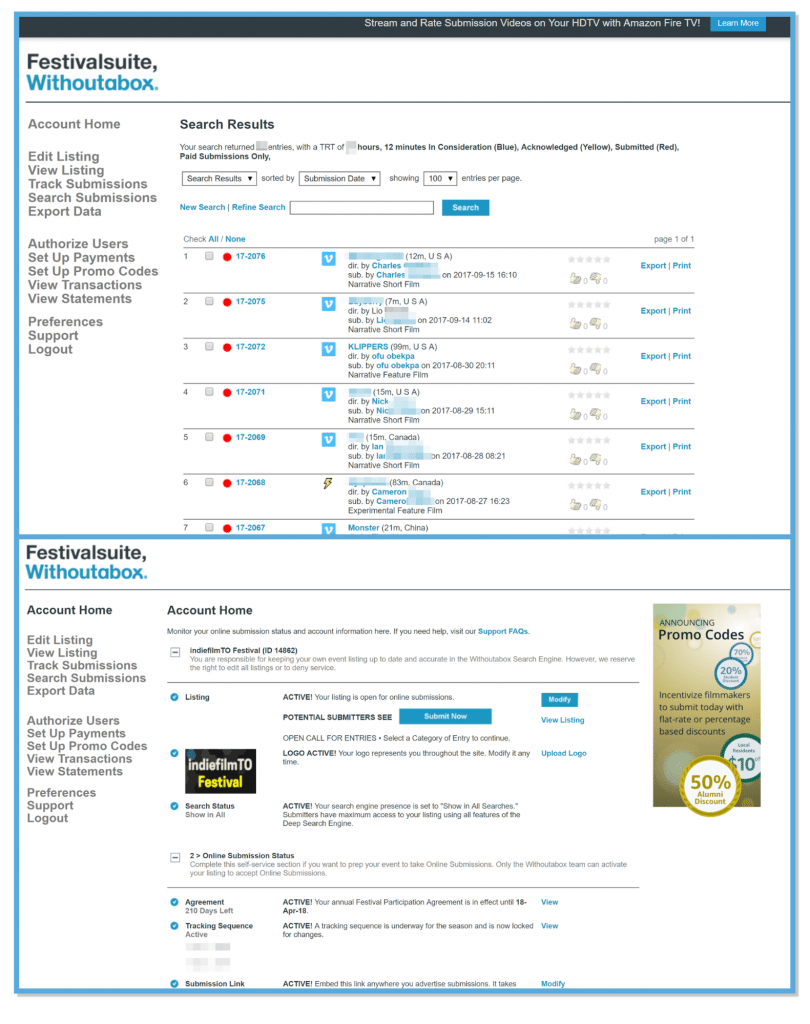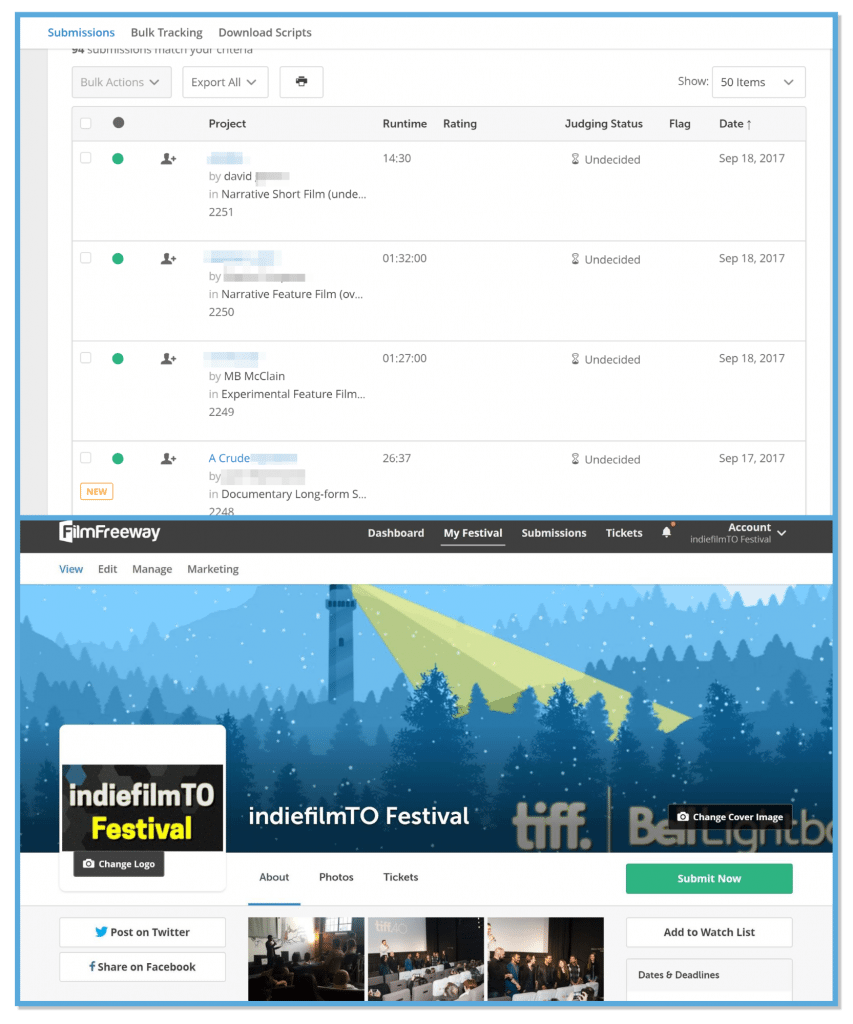6 Things You Don’t Want To Hear About Film Festivals
How do you get into a top tier festival?
Is there any value in the “lower tiered” festivals?
I studied questions like this for years now — both as a filmmaker and as a festival programmer.
You ever feel like festival submissions are this black hole of no-information?
You pay money to them – you wait for some indefinite amount of time – and you then receive a rejection letter with no explanation other than “competition was very tough this year.”
IT CAN SUCK.

Piers Handling (CEO of TIFF), Bern Euler (CEO of Canadian Film Fest), Michele Alosinac (Film Sector of Toronto’s City Hall), Carolle Brabant (Executive Director of Telefilm), Curt Jaimungal (brown dude who runs indiefilmTO, AKA me)
After running panels with festival heads, from the smallest festivals, to the largest (yes, that’s the CEO of TIFF above), I’ve learned quite a few shocking things.
Below is me shedding light on some things you do NOT want to hear about film festivals.
6) You Only Get FIVE Seconds Before They Stop Watching
This one comes straight from one of the world’s top festival programmers. In fact, he said it’s more like 3 seconds.
If you don’t capture their attention or intrigue them or show them you’re not an amateur who starts their film with an alarm clock, then (and ONLY then) do they proceed to the next few minutes.
And if THOSE few minutes don’t wow them, then they just close the window.
It doesn’t matter that you spent 2,000 hours on your feature. It doesn’t matter that you sold your house and car to fund your film and its submission fees.
You get FIVE seconds.
Here’s an interesting article on a guy who discovered just that. (in my opinion, he got lucky by getting a few minutes of their time. Usually it’s just seconds.)
5) Getting Accepted Is NO Guarantee Of Anything
I used to think that if you get into Sundance or TIFF that your career will be made.
The red carpet will don wherever you go. Naked people will sing your praises and hand you flowers whenever you’re feeling down.
But I was dead wrong. (not about the naked people though. I really should get that restraining order on my neighbor.)
What ends up happening is you’re standing there after your film screens with people who are interested in your film, but you don’t know what to do to follow up. HINT: make sure to have your next project ready to be produced, learn how to pitch to get their attention, and learn to network effectively.
You’ve heard that “4 out of 5 films at Sundance get distribution” (source) and it sounds hopeful, right? Wrong.
What they don’t tell you is that 90% of those distributing are films that already have a team of marketers / sales agents already fighting on the film’s behalf.
People get accepted into top tier festivals all the time, and are back working their non-industry job, struggling for funding, right after their festival-award-induced-high wears off.
Just last week I was talking with someone who one basically the top award you could win at Hot Docs (documentary festival) and he’s STILL working minimum wage in the food industry.
If you have of agents / marketers working for you already, then great you can skip this section.
If not, then you gotta HUSTLE like mad. Here’s a great video on how to make the most of film festivals from Hollywood veterans, and if you want to learn to network, then here’s our guide on best practices when networking at festival parties.
4) If you’re submitting to a large festival, you’re already on losing end
The chances of you getting in (all other things being equal) to a top tier festival are about ~1%.
This is calculated from Sundance and TIFF’s public numbers, which are ~13,900 submitted vs 120 accepted (source) and ~7,000 submitted vs ~380 accepted (source) respectively. (Stephen Follow’s blog is fantastic blog if you’re a mathematical nerd like me btw for all things “film data”)
Did you know that the biggest festivals proactively request films to submit into their festival?
What does that mean? It means that TIFF (for example) has an active relationship with all the producers / firms of the films they think are festival worth before the films are even wrapped (perhaps because it has Jake Gyllenhaal).
TIFF will then ask the film to submit to their festival (for free, mind you) and the chances of it getting accepted at that point is above 50% (compare that to your rate of 1%).
This is the difference between solicited and unsolicited films.
Your films belong in the unsolicited category, by the way. And they take only a handful of unsolicited.
So what do you do?
The traditional answer is to submit to festivals you have a chance in getting into, AKA submit to lower tiered festivals.
But how do you know which ones to submit to?
You use FilmFreeway’s search functionality and find a festival you feel is a match for your film. The secret is to the reach out to the programmers BEFORE you actually submit (FilmFreeway allows this).
Why?
You want to find out what the chances of getting accepted are before you pay submission fees. This way you make an informed decision on the likelihood of getting accepted directly. Here’s a script you can use:
Hi [Film Festival Name / Programmer],
I’m a filmmaker from [CITY] and am choosing festivals to submit to. I really like yours because of [GENUINE REASON 1] and [GENUINE REASON 2]. (make sure these reasons are genuine)
What I’m wondering is, does my fit into your programming? It’s about [LOGLINE, GENRE, and RUNTIME].
If it does fit, can you provide me with some examples of films that have gotten into your festival recently that are similar to mine?
Thanks! I look forward to your response.
- [YOUR NAME]
The reason for this last question is that every festival is dying to get your money so they’ll say “YES your film has a reasonable chance.” However, by asking that follow up question you put the burden of proof on them.
The reason for including your runtime / genre is that you’d be surprised how many festivals program things simply because of runtime and genre. (for example, they might need to break up the monotony of heavy-handed 10min+ dramas, so they’re looking for a 2 min comedy or vice versa).
3) The Psychology of FilmFreeway vs. Withoutabox (winner declared)
Ah… The old fight between Withoutabox (WAB) and FilmFreeway.
As a filmmaker, which one do you choose? The short answer is both.
The long (more accurate) answer is that design matters and customer service matters.
In fact, 94%of people regard a website as more mistrusful if it’s not designed properly.
Which is more pleasant to you? Here’s how WAB’s interface looks as a programmer (this is taken from the indiefilmTO Festival):

And here’s how FilmFreeway looks as a festival programmer:

I’ll let you decide.
Moving on from web design, I’ve had more positive first (and second) hand experiences with with FilmFreeway vs WAB as a programmer. What am I talking about?
The Director of Business Development of FilmFreeway (Andrew Michael) is very responsive to emails and actually gets back to filmmakers / programmers within a day, whereas on WAB it takes weeks and sometimes they don’t respond at all. According to Forbes:
“Responding quickly to an inquiry has the single greatest impact on customer satisfaction. The Customer Satisfaction Index reveals that companies with an average first-response time of less than 10 hours have customer satisfaction ratings of over 90%.” (source)
Listen… we’re all humans, and festival programmers are no different.
Nothing can make up for you having a bad film, but all things being equal, there are cognitive biases that will work against you on WAB simply by the fact of programmers attributing their negative experience to your work.
Here’s a fascinating study from Yale on how even a small negative experience can DRASTICALLY impact your opinion on a neutral story.
What this means for you is that if they’re choosing between your film on WAB, and someone else’s equally as good film on FilmFreeway, they’re more likely to go with the other guy.
I want YOU to be that other guy and have every advantage you can. You make the call.
2) The Harsh Truth About Asking For Waivers
Standard advice you hear out there is “email and ask for a waiver. There’s no harm!”
As a filmmaker, I used to believe this.
Speaking as a festival head, however, I don’t. There is harm. But it’s subtle.
Firstly, it makes you look low status (see our video on Power and status in the film industry below, or the full article here)
[media_video teatime_video_unique_id=”88f30a21a33a8aac86ea56ac3ae109fa” teatime_video_url=”https://www.youtube.com/watch?v‹´›w-t01S0FSXE” teatime_video_size=”{‹²›video_size‹²›:‹²›size_fluid‹²›,‹²›size_fixed‹²›:{‹²›width‹²›:‹²›640‹²›,‹²›height‹²›:‹²›320‹²›}}” __fw_editor_shortcodes_id=”0d82df2870101cdf942214228c905b66″ _array_keys=”{‹²›teatime_video_size‹²›:‹²›teatime_video_size‹²›}” _fw_coder=”aggressive”][/media_video]FilmFreeway has a new feature where the festival programmer themselves can reach out to YOU and ask you for a waiver.
This is a MUCH better system since it means we’ve personally looked over your film and we as programmers think it will fit.
Plus it changes the dynamic, where all of a sudden YOU are the one that is like “Hm… should I accept this festival’s waiver code? Are they worth it?” vs “PLEASE GIVE WAIVER CODE. I BROKE. I LIVE IN SHOE BOX.”
By the way, if you want to increase your chances of getting a waiver, then make sure you include how you can help the festival in the email.
For example, if you have 10,000 twitter followers, make sure to include that in your email and say you’re willing to tweet at them. Make sure to bold what you’re offering so it stands out. Which I know first hand since my team receives 15+ people asking for waivers every day and it gets overwhelming.
Remember, you want to stand out and get their attention; a principle of pitching we teach.
But what if you don’t have a following?
Then you gotta figure out some other way of adding value. For example, by guaranteeing them “If we get in, I can guarantee you at least 10 tickets sold to your festival because my family and friends will come. If not, you can pull my film from the selection, no harm done.”
Browsing the festival’s submission page on WAB / FilmFreeway is a great way of getting more info and seeing the goals of the festival.
I’d biases towards FilmFreeway only because the interface is much cleaner and more readable than WAB’s. Plus the festival programmers have to update their description on FilmFreeway each year, whereas with WAB some festivals have copy that is 10+ years old. But to each their own.
If you still have no clue what to offer, then you can always ask them directly. Say something like near the beginning of your waiver email in bold:
“I don’t have a big following on social media, but I still want to make sure you get value out of this. What’s something I can do that will benefit your festival?”
We’re actually giving away “5 Ways To Add Value When You Seemingly Have None” in a few weeks via our email list so join that for free if you like.
1) There Is Little Value In The Low Tier Festivals, BUT…
Very few seasoned film Exec Producers will look at your festival run and want to invest in your next films because it got screened at Tommy’s Two Thumbs Up Theater Festival.
This is why we’re doing our festival at the TIFF Lightbox; a venue that’s associated with TIFF.
I’m not an idiot. I know we’ve only been around for 2 years so we have no inherent prestige but I still want to make it worth it for the filmmakers who get accepted and the TIFF venue is one way we solve this problem (btw, we’re still actively making our festival more and more crazy).
The good news is that there IS value in accumulation of awards and screenings, despite being from low tiered festivals; simply so that you can say how many places it was screened at and how many awards it won, to people who don’t normally invest in films.
In Silicon Valley, this is what we call a Vanity Metric, and while Vanity Metrics are normally frowned upon, they can be useful. (eg. for getting investment for those who aren’t normally film investors, and for your own morale)
Second, getting accepted into several lower tiered festivals is validation you’re doing something right in terms of filmmaking. (on another positive note, getting rejected by a major festival is actually NOT necessarily that you’re doing something wrong — since they reject many outstanding films)
***
By the way, if you want a 50% submission code to OUR festival, then feel free to sign up below and I’ll hook you up with one on the house.
Either way, you’re gonna do great. Keep taking action, get feedback, and iterate on your not just your films but your film career. You’ll make it. I know you will.
And I’m gonna help you in this journey.
Til next time my love,
– Curt






Hi Curt,
Thanks for an excellent article. I’m so disillusioned by film festivals these days, For the lower tier fests, it seems they’re more concerned with the budget and production value than what the films are actually about. My latest film, which has been rejected by 15 lower level fests, only cost 7 grand to make, but I know it looks and sounds like it cost more – and it’s about something. Also, it seems like if you don’t know the programmer personally, tbere is a bias against you. Frankly, I’m over festivals completely. I much prefer to rent theaters or find places for alternative screenings myself. But now, even some of those are falling through. I was notified today that our local art house theater, which operates under a huge endowment from a local millionaire, will no longer show locals films because it’s too “disruptive.” Yet, they pay a lot of money to bring in foreign /other American filmmakers twice a month to show and talk about their work. Anyway, if I sound bummed out and a little negative about things, it’s because I am. I’m not sure it’s worth making movies if I can’t get financing and have limited opportunities to show them after they’re done.
Thanks,
Jim
Exactly. These are issues we’re trying to address for OUR festival. And I agree about renting out your own theatres, in fact, 60% of the profit from my feature came from that method.